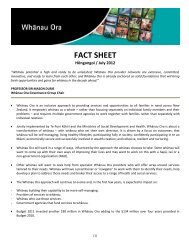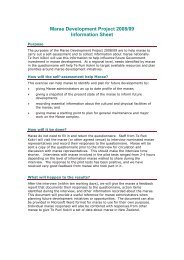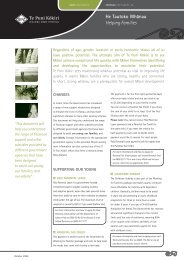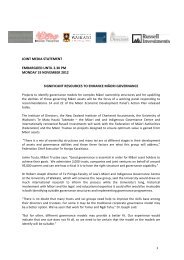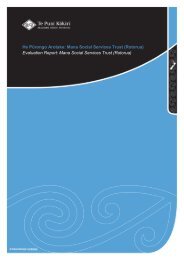Measuring performance and effectiveness for Mäori ... - Te Puni Kokiri
Measuring performance and effectiveness for Mäori ... - Te Puni Kokiri
Measuring performance and effectiveness for Mäori ... - Te Puni Kokiri
You also want an ePaper? Increase the reach of your titles
YUMPU automatically turns print PDFs into web optimized ePapers that Google loves.
PART 3 : COMPARATIVE MEASURES –<br />
GOOD PRACTICE FOR MÄORI<br />
3.1 THE IMPORTANCE OF<br />
COMPARATIVE ANALYSIS<br />
FOR MÄORI<br />
Mäori academics Durie <strong>and</strong> Kingi (2010)<br />
emphasise that comparative measures<br />
<strong>for</strong> Mäori are important <strong>for</strong> measuring<br />
<strong>effectiveness</strong> <strong>and</strong> impacts <strong>for</strong> Mäori. Universal<br />
indicators (e.g. the total employment rate)<br />
without comparative measures are insufficient<br />
measures of need <strong>and</strong> outcome (Durie, 2005b).<br />
The purposes of comparative measurement can<br />
include ensuring:<br />
• the <strong>effectiveness</strong> <strong>and</strong> efficiency of<br />
government services in achieving the aims of<br />
those services, such as meeting Ministerial<br />
priorities (The Treasury, 2012a, p.8); <strong>and</strong><br />
• equitable outcomes between different<br />
population groups (OECD, 2009; Human<br />
Rights Commission, 2010; 2011a, p.12).<br />
3.2 ACHIEVING MEANINGFUL<br />
COMPARISONS BETWEEN<br />
ETHNIC GROUPS<br />
Mäori vs. non-Mäori comparisons<br />
Mäori compared to non-Mäori is the most<br />
commonly used comparative measure. The<br />
Department of Corrections, <strong>for</strong> example, gives<br />
such a measure in its annual report in relation<br />
to the successful completion of communitybased<br />
sentences <strong>and</strong> orders.<br />
However, Mäori academic authors have<br />
criticised this approach because:<br />
• Durie suggests: “Sometimes more relevant<br />
benchmarks may be found with other iwi,<br />
or in other indigenous communities. It is<br />
misleading to use crude comparisons with<br />
non-Mäori as a type of shorth<strong>and</strong> <strong>for</strong> best<br />
outcomes, or to assume that Mäori/non-<br />
Mäori comparisons always provide useful<br />
in<strong>for</strong>mation about Mäori progress” (Durie,<br />
2003a, p.202);<br />
• ‘non-Mäori’ is not an ethnic group, but<br />
a collection of specific ethnic groups<br />
experiencing disparate outcomes; <strong>and</strong><br />
• it may mask differing results achieved <strong>for</strong><br />
different ethnic groups such as between<br />
Europeans <strong>and</strong> Pacific peoples, the latter<br />
of whom are much closer to Mäori in socioeconomic<br />
status than other groups included<br />
in the non-Mäori category (Statistics New<br />
Zeal<strong>and</strong>, 2001a, p.90, 2001b, pp.63-71;<br />
Humpage, 2002, pp.178-9).<br />
Full analysis by ethnicity as<br />
better practice<br />
Comparing Mäori against other specific ethnic<br />
groups is more consistent with ensuring equity<br />
between those groups. Such an approach<br />
is endorsed by the OECD (2009) <strong>and</strong> UN<br />
Committee <strong>for</strong> the Elimination of Racial<br />
Discrimination (Human Rights Commission,<br />
2010, p.3-4; 2011a, p.12). “Another function of<br />
the outcome indicators may be as a check on<br />
the crucial social issue of equity. Are individual<br />
clients in similar situations being treated<br />
equally .... Such measures might reasonably<br />
cover the distribution of key services by socioeconomic<br />
groups” (OECD, 2009, p.83).<br />
Equity <strong>and</strong> discrimination<br />
The concern about equity is all the more<br />
important in view of the need to counter<br />
discrimination, which does occur in New<br />
13<br />
C O M P A R A T I V E M E A S U R E S – G O O D P R A C T I C E F O R M Ä O R I



